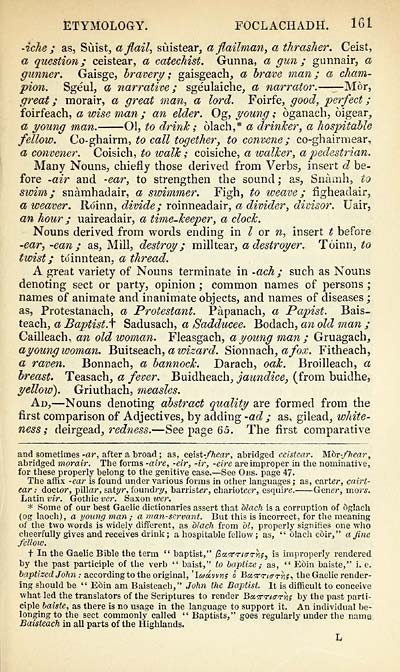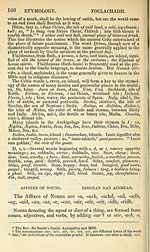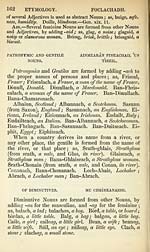Books and other items printed in Gaelic from 1841 to 1870 > Stéidhean a' Ghràmair Ghaëlig
(189) Page 161
Download files
Complete book:
Individual page:
Thumbnail gallery: Grid view | List view

ETYMOLOGY.
FOCLACHADH. 161
•iche ; as, Sùist, a flail, sùistear, a flailman, a thrasher. Ceist,
a question ; ceistear, a catechist. Gunna, a gun ; gunnair, a
gunner. Gaisge, bravery ; gaisgeach, a òrave man ; a cham-
pioti. Sgèul, a narrative ; sge'ulaiche, a narrator. Mòr,
great ; morair, a great man, a lord. Foirfe, good, perfect ;
foirfeach, a wise man ; an elder. Og, young ; òganach, òigear,
a young man. Ol, to drinJc ; òlach,* a drinJcer, a hospitable
fellow. Co-ghairm, to call together, to convene ; co-ghairmear,
a convener. Coisich, to walk ; coisiche, a walker, a pedestrian.
Many Nouns, chiefly those derived from Verbs, insert d be-
fore -air and -ear, to strengthen the sound ; as, Snàmh, io
swim ; snàmhadair, a swimmer. Figh, to weave ; fìgheadair,
a weaver. Rdinn, divide; roinneadair, a divider, divisor. Uair,
an hour ; uaireadair, a time-Jceeper, a clock.
Nouns derived from words ending in l or n, insert t before
-ear, -ean ; as, Mìll, destroy ; mìlltear, a destroyer. Tòinn, to
twist ; tdinntean, a tJiread.
A great variety of Nouns terminate in -ach ; such as Nouns
denoting sect or party, opinion ; common names of persons ;
names of animate and inanimate objects, and names of diseases ;
as, Protestanach, a Protestant. Pàpanach, a Papist. Bais-
teach, a Baptist.f Sadusach, a Sadducee. Bodach, an old man ;
Cailleach, an oldwoman. Fieasgach, ayoung man ; Gruagach,
ayoung woman. Buitseach, a wizard. Sionnach, afox. Fitheach,
a raven. Bonnach, a bannocJc. Darach, oaJc. Broilleach, a
breast. Teasach, a fever. Buidheach, jaundice, (from buidhe,
yellow). Griuthach, measles.
Ad, — Nouns denoting abstract quality are formed from the
flrst comparison of Adjectives, by adding -ad ; as, gilead, wJiite-
ness ; deirgead, redness. — See page 65. The fìrst comparative
and sometimes -ar, after a broad ; as, ceist-f hear, abridged ceistear. Mòv-fhear,
abridged morair. The forms -aire, -eir, -ir, -eire areimproper in the nominative,
for these properly belong to the genitive case. — See Ons. page 47.
The affix -ear is found under various forms in other languages ; as, carter, cairt-
ear : doctor, pillar, s&tyr, iounàry, barrister, chaiiotm', esquire. Gener, mors.
Latin vir. Gothic ver. Saxon wer.
* Some of our best Gaelic dictionaries assert that òlach is a corruption of òglach
(og laoch), a young man ; a man-servant. But this is incorrect, for the meaning
of the tvvo vvords is widely different, as òlach from òl, properly signities one who
cheerfully gives and receives drink ; a hospitable fcllow ; as, " olach còir," a fine
fellow.
t In the Gaelic Bible the term " baptist," fia.tr<rnr7ris, is improperly rendered
by the past participle of the verb " baist," to baptize ; as, " Eòin baiste," i. e.
baptized John : accordingto the original, 'Imkvv/i; ò Bocvrurr'/iSi the Gaelic render-
ing should be " Eòin am Baisteach," John the Baptist. It is difficult to conceive
what led the translators of the Scriptures to render Ba.TTi/rrh; by the past parti-
ciple baiste, as there is no usage in the language to support it. An individual be-
longing to the sect commonly called " BaptLsts," goes regularly under the name
Baisteach in all parts of the Highlands.
L
FOCLACHADH. 161
•iche ; as, Sùist, a flail, sùistear, a flailman, a thrasher. Ceist,
a question ; ceistear, a catechist. Gunna, a gun ; gunnair, a
gunner. Gaisge, bravery ; gaisgeach, a òrave man ; a cham-
pioti. Sgèul, a narrative ; sge'ulaiche, a narrator. Mòr,
great ; morair, a great man, a lord. Foirfe, good, perfect ;
foirfeach, a wise man ; an elder. Og, young ; òganach, òigear,
a young man. Ol, to drinJc ; òlach,* a drinJcer, a hospitable
fellow. Co-ghairm, to call together, to convene ; co-ghairmear,
a convener. Coisich, to walk ; coisiche, a walker, a pedestrian.
Many Nouns, chiefly those derived from Verbs, insert d be-
fore -air and -ear, to strengthen the sound ; as, Snàmh, io
swim ; snàmhadair, a swimmer. Figh, to weave ; fìgheadair,
a weaver. Rdinn, divide; roinneadair, a divider, divisor. Uair,
an hour ; uaireadair, a time-Jceeper, a clock.
Nouns derived from words ending in l or n, insert t before
-ear, -ean ; as, Mìll, destroy ; mìlltear, a destroyer. Tòinn, to
twist ; tdinntean, a tJiread.
A great variety of Nouns terminate in -ach ; such as Nouns
denoting sect or party, opinion ; common names of persons ;
names of animate and inanimate objects, and names of diseases ;
as, Protestanach, a Protestant. Pàpanach, a Papist. Bais-
teach, a Baptist.f Sadusach, a Sadducee. Bodach, an old man ;
Cailleach, an oldwoman. Fieasgach, ayoung man ; Gruagach,
ayoung woman. Buitseach, a wizard. Sionnach, afox. Fitheach,
a raven. Bonnach, a bannocJc. Darach, oaJc. Broilleach, a
breast. Teasach, a fever. Buidheach, jaundice, (from buidhe,
yellow). Griuthach, measles.
Ad, — Nouns denoting abstract quality are formed from the
flrst comparison of Adjectives, by adding -ad ; as, gilead, wJiite-
ness ; deirgead, redness. — See page 65. The fìrst comparative
and sometimes -ar, after a broad ; as, ceist-f hear, abridged ceistear. Mòv-fhear,
abridged morair. The forms -aire, -eir, -ir, -eire areimproper in the nominative,
for these properly belong to the genitive case. — See Ons. page 47.
The affix -ear is found under various forms in other languages ; as, carter, cairt-
ear : doctor, pillar, s&tyr, iounàry, barrister, chaiiotm', esquire. Gener, mors.
Latin vir. Gothic ver. Saxon wer.
* Some of our best Gaelic dictionaries assert that òlach is a corruption of òglach
(og laoch), a young man ; a man-servant. But this is incorrect, for the meaning
of the tvvo vvords is widely different, as òlach from òl, properly signities one who
cheerfully gives and receives drink ; a hospitable fcllow ; as, " olach còir," a fine
fellow.
t In the Gaelic Bible the term " baptist," fia.tr<rnr7ris, is improperly rendered
by the past participle of the verb " baist," to baptize ; as, " Eòin baiste," i. e.
baptized John : accordingto the original, 'Imkvv/i; ò Bocvrurr'/iSi the Gaelic render-
ing should be " Eòin am Baisteach," John the Baptist. It is difficult to conceive
what led the translators of the Scriptures to render Ba.TTi/rrh; by the past parti-
ciple baiste, as there is no usage in the language to support it. An individual be-
longing to the sect commonly called " BaptLsts," goes regularly under the name
Baisteach in all parts of the Highlands.
L
Set display mode to:
![]() Universal Viewer |
Universal Viewer | ![]() Mirador |
Large image | Transcription
Mirador |
Large image | Transcription
Images and transcriptions on this page, including medium image downloads, may be used under the Creative Commons Attribution 4.0 International Licence unless otherwise stated. ![]()
| Rare items in Gaelic > Books and other items printed in Gaelic from 1841 to 1870 > Stéidhean a' Ghràmair Ghaëlig > (189) Page 161 |
|---|
| Permanent URL | https://digital.nls.uk/101713867 |
|---|
| Description | Out-of-copyright books printed in Gaelic between 1631 and 1900. Also some pamphlets and chapbooks. Includes poetry and songs, religious books such as catechisms and hymns, and different editions of the Bible and the Psalms. Also includes the second book ever published in Gaelic in 1631. |
|---|

